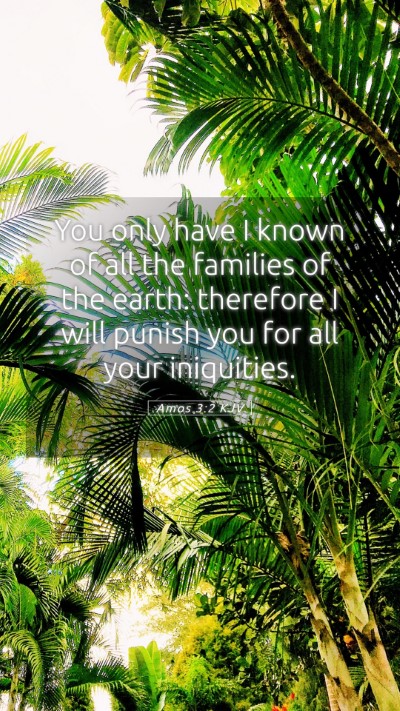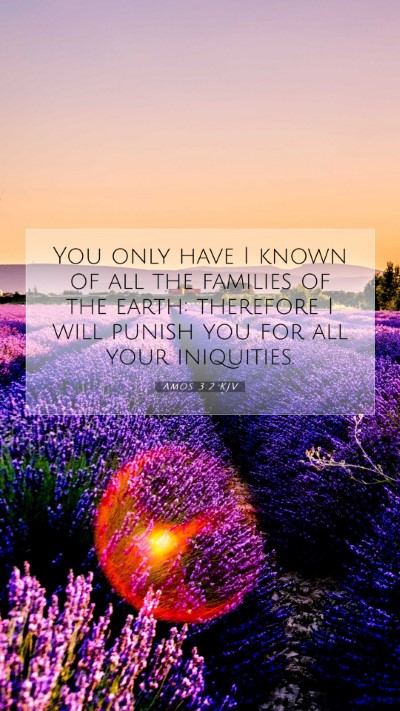Old Testament
Genesis Exodus Leviticus Numbers Deuteronomy Joshua Judges Ruth 1 Samuel 2 Samuel 1 Kings 2 Kings 1 Chronicles 2 Chronicles Ezra Nehemiah Esther Job Psalms Proverbs Ecclesiastes Song of Solomon Isaiah Jeremiah Lamentations Ezekiel Daniel Hosea Joel Amos Obadiah Jonah Micah Nahum Habakkuk Zephaniah Haggai Zechariah MalachiAmos 3:2 Meaning
What is the meaning of Amos 3:2?
You only have I known of all the families of the earth: therefore I will punish you for all your iniquities.
Amos 3:2 Bible Verse Meaning
Understanding Amos 3:2
Amos 3:2 states, "You only have I known of all the families of the earth: therefore I will punish you for all your iniquities." This verse carries profound implications regarding the relationship between God and Israel, highlighting the concept of divine selection and accountability.
Commentary Overview
Exploring the insights from several public domain commentators including Matthew Henry, Albert Barnes, and Adam Clarke offers a richer understanding of this verse.
Matthew Henry's Commentary
Matthew Henry emphasizes the unique relationship between God and Israel, stating that God has chosen this nation among all others. This selection entails responsibility for their actions. Henry notes that knowledge of God comes with expectation; thus, Israel, having received God's favor, is held to a higher standard of conduct.
Albert Barnes' Interpretation
Albert Barnes provides a detailed analysis of God’s intimate knowledge of Israel. He explains that "to know" signifies a deep, covenantal relationship. This exclusivity calls for vigilance against sin, as the chosen people ought to reflect God’s holiness. Barnes highlights that God's judgment is not arbitrary but a response to the covenantal relationship established with Israel.
Adam Clarke's Insights
Adam Clarke elaborates further on the implications of being ‘known’ by God. He connects this knowledge with the historical context of Israel's journey, demonstrating how their repeated disobedience has led to divine warning and eventual punishment. Clarke stresses the importance of repentance and the dire consequences of ignoring divine instruction.
Theological Significance
This verse serves as a sobering reminder of the covenant relationship between God and His people. It highlights several theological themes:
- Divine Selection: God's choice of Israel among the nations underscores the notion of choseness.
- Accountability: With special knowledge comes great responsibility; Israel must account for its sins.
- Judgment and Mercy: God's desire to correct His chosen people rather than abandon them reveals both His justice and goodness.
- Historical Continuity: God's dealings with Israel inform contemporary understanding of divine expectation.
Practical Applications
For modern readers, Amos 3:2 challenges individuals and communities to reflect on their relationship with God:
- Self-Examination: Believers are encouraged to examine their lives for areas needing repentance.
- Understanding Scripture: This verse illustrates the importance of contextual reading in Bible study.
- Community Responsibility: Just as Israel bore its collective sins, communities today must work towards accountability.
- Emphasis on Reconciliation: The call to return to God highlights the ongoing nature of divine grace.
Related Cross References
To gain a deeper understanding of Amos 3:2, consider these related verses:
- Deuteronomy 7:6: "For you are a holy people to the Lord your God; the Lord your God has chosen you to be a people for His own possession."
- Romans 3:1-2: "What advantage has the Jew? Or what is the benefit of circumcision? Great in every respect."
- Hosea 4:6: "My people are destroyed for lack of knowledge." This ties back to the importance of knowing God's standards.
Conclusion
In understanding Amos 3:2, we see the importance of acknowledging our unique relationship with God, the need for accountability, and the call to live righteously as a response to His grace. This interpretation not only aids individual study but enhances Bible study groups and resources, allowing for richer discussions in exploring the profound meanings of Scripture.


